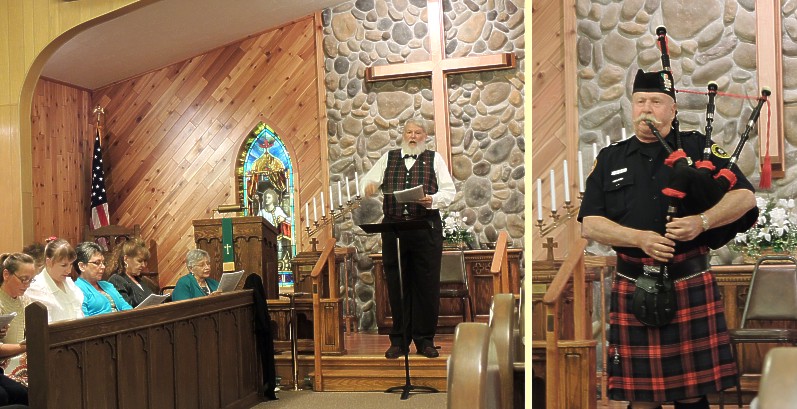Kansas Snapshots by Gloria Freeland - August 9, 2013
Gymanfa Ganu
The pews were marked "Soprano," "Alto," "Tenor" and "Bass." Since Katie is an alto in a couple of Kansas State
University choirs, I told her I was sticking with her in the alto section. My ability to follow music is pretty
limited, so I wanted to be with someone who knew what she was doing. Husband Art sat behind us in the tenor section -
the only person to sit in that pew.
We were at the Union Congregational Church in Three Lakes, Wis. to take part in the Gymanfa Ganu (pronounced
gih-MAHN-vuh GAH-nee) - a Welsh festival of sacred songs. The traditional singing of hymns in four-part harmony in Wales
can be traced back to about the 12th century.
Art and I had attended a previous Gymanfa Ganu in the church in the 1990s when we first started taking our family
to the North Woods for our summer vacations. We liked it back then, but had missed subsequent festivals, so we thought
it would be fun to go again. A good reason to expose Katie to the music is that Art and I both have some Welsh in our
backgrounds. Art's great-grandfather Tom Vaughan and my great-great-grandmother Eliza Davis were born in Wales. We've
been there several times, first to check out where they came from and later just to experience the beautiful
green hills. Art even bought a Welsh-English dictionary some years ago so he knows some words and how to pronounce
them.
Katie was not that excited to attend because she thought we were just going to listen. But when she realized we were
there to participate, she brightened up. She loves singing, and relished the opportunity to use her voice.
The conductor, Rev. Joseph Corbin of Reedsburg, Wis., reminded us a bit of Santa Claus with his full white beard
and plaid vest of red and green - the Welsh national colors. He greeted us enthusiastically and then began leading us
through the program with his rich baritone voice honed by a degree in music. The songs had unfamiliar Welsh names like
"Bryn Califaria," "Crug-y-bar," "Blodwen," and "Colon Lan, " but much of the music was familiar.
Corbin didn't have us sing through the hymns one right after the other. He chose among the verses, sometimes telling
the women to sing certain verses and the men others. At other times, he'd ask us to repeat verses or to slow down or
to sing louder or to sing a cappella ... without the organ or piano accompaniment.
We sang some songs in English and some in Welsh, although I doubt we did a great job on the latter. While Welsh
uses letters drawn from the English alphabet, many are not pronounced in the same way. "Ff" is sounded like an English
"f," but a single "f" is used for the English "v" sound. There is no "v" in Welsh. "Ll" has no equivalent sound in
English. "W" is spoken as in English, unless there is a consonant on both sides and then it becomes a vowel, sounded
like the "oo" in the word "cool." Fortunately, we were not being graded!
Gymanfa Ganu festivals are held at various locations around the U.S. where there were sizeable numbers of Welsh
settlers. In Wisconsin, they are assisted by the Welsh Gymanfa Ganu Association of Wisconsin.
That association also supports the work of the Great Plains Welsh Heritage Project, based in Wymore, Neb., an area
that reminded Welsh immigrants of their homeland with its rolling hills and the nearby Blue River. The mission of the
project is "to discover, preserve, interpret and celebrate the history and contributions of Welsh pioneers on the
North American prairies, to further public understanding and appreciation of America's ethnic and cultural diversity."
For us, there is a touch of irony in discovering Wymore, population 1,400, is the site of the project. It is located
about an hour and a half from our home in Manhattan, Kan. and during the many years of our travel to and from Wisconsin,
we have regularly chosen a route that skirts the village.
When our Gymanfa Ganu was over, we spoke briefly with Rev. Corbin and his wife Kim for Katie wanted to know how she
could obtain a copy of the hymnal. Then we left, amazed by the sheer beauty of how our voices had blended together. It
was almost as if the music came from deep within us. Katie said she was surprised by how well all of us could
sight-read and sing along in four-part harmony. And although we could only approximate the Welsh, Katie and I had
enjoyed the sound of it - I, because I love different languages, and Katie, because it reminded her of the "Elvish"
language J.R.R. Tolkien used in "Lord of the Rings."
But I have a hunch our enjoyment also arose from another place. Because the Welsh spoke almost accent-free English
and dressed as their English neighbors, emigrants from that land blended into America effortlessly. And so, there is
next to nothing in our culture that reminds us that significant numbers of Welsh settled in America the way that St.
Patrick's Day brings to mind the Irish immigrants or Oktoberfest makes us think of our German roots. But the Gymanfa
Ganu is one such reminder that Tom Vaughan and Eliza Davis were also part of America's patchwork.
